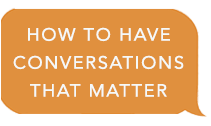Celeste Headlee, who has worked as an NPR and Public Radio host for decades, knows the ingredients of a great conversation: honesty, brevity, clarity and a healthy amount of listening. Author of We Need to Talk: How to Have Conversations That Matter (2017), Headlee notes that most of us don’t listen with the intent to understand, but rather to reply — a dynamic that is clearly evident in many dysfunctional relationships.
In this edited version of her TedTalk, Headlee shares 10 useful rules for having better conversations. “Go out, talk to people, listen to them, and be interested in them,” she says. “Be prepared to be amazed.” I encourage you to watch the entire TedTalk; it is more than worthwhile.
* * *
Don’t multitask. More than just setting your device aside – be present. Be in that moment. Don’t be thinking about another part of your day; if you don’t want to have a conversation, don’t! Don’t be half in, half out.
Don’t pontificate. “If you want to state your opinion without any opportunity for response or argument or pushback or growth, write a blog.” Enter each conversation assuming that you can learn something new.
Use open-ended questions. Try on the shoes of a journalist, don’t go for easy yes/no responses. Have them describe what they are feeling, thinking, or expressing. Don’t do it for them. Liven up the conversation with open-ended questions and you’re guaranteed a more interesting response.
Go with the flow. Let thoughts come and go. Follow the conversation, not what you thought the conversation would be like. Don’t hold on to questions just because they’re really good questions. Listen, react, and keep moving with the conversation.
If you don’t know, say that you don’t know. Don’t make your talk cheap, err on the side of caution and always speak like you’re on record.
Don’t equate your experience with theirs. Your experiences are never the same, no matter what the situation. Everyone is unique in their situations and how they feel, and most importantly — it’s not about you.
Try not to repeat yourself. Repeating yourself sounds condescending and creates boring conversations. And we do it, a lot. When you want to make a point it becomes a habit. Stop it.
Stay out of the weeds. People don’t care about the little details – the years, names, dates, etc. Leave them out. Focus on you, what you like and what you have in common with the person with whom you are speaking.
Listen. This is the most important one. So many important, successful people have said it over and over again. Like Buddha: “If your mouth is open, you’re not learning.”
Be brief. Keep it short enough to retain interest, but long enough to cover the subject.
* * *
